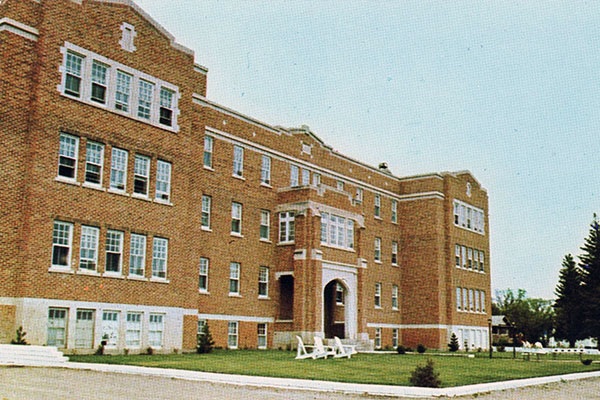(Photo of the Brandon Residential School. Courtesy of the Manitoba Historical Society.)
By: Miranda Leybourne, Local Journalism Initiative Reporter, Brandon Sun
WARNING: Disturbing content
Sioux Valley Dakota Nation is asking the public to come forward with any information they have regarding the former Brandon Residential School.
The Residential School Missing Children’s Investigation team at the First Nation, located 50 kilometres northwest of Brandon, is seeking to gather photos, maps, records from the school, sanatoriums and hospitals, along with general history from the area, found artifacts and testimony from survivors or their families who are searching for lost loved ones.
Such items are often spread far and wide, Brent Perrin, the team’s community and field survey co-ordinator, told the Sun.
“Something that our project has been looking at doing is trying to find the archives and information,” he said. “We’re thinking maybe people in the … Brandon area might have some information that could provide us with ways to help the investigation.”
Perrin said that what he’s able to gather from the public will help the team as it works to identify missing children who were forced to attend the school, locate the unmarked graves of children who never made it home, and support community-led commemoration plans.
The exact extent of those plans will depend greatly on the type of information gathered, Perrin said, adding that future decisions on how to commemorate residential school survivors, those who never made it home and their families would be up to Sioux Valley Dakota Nation elders to decide.
The Brandon Residential School, which was located in the Rural Municipality of Cornwallis, five kilometres northwest of Brandon, was open from 1895 to 1972. Until 1925, it was run by the Missionary Society of the Methodist Church. After that, the Board of Home Missions of the United Church of Canada took over, In 1969, the federal government assumed management of the school and turned it over to the Oblates of Mary Immaculate until the school’s closure. By the 1940s, students from an area stretching from central Saskatchewan to southwestern Ontario were forced to attend the school.
Earlier this month, as the Sun previously reported, three Manitoba chiefs were calling on the provincial government to grant Turtle Crossing Campground — the site of the former school — protection under the Heritage Resources Act, which would allow a team to search the site for unmarked graves.
The province has not responded to requests from the Sun about whether or not heritage status would be granted to the site.
The Sun made several attempts to contact Sioux Valley Dakota Nation to speak further about the call for information, but did not receive a reply by press time.
Support is available for those affected by their experience at Indian Residential Schools and in reading difficult stories related to residential school. The Indian Residential School Crisis Line offers emotional and referral services 24 hours a day at 1-866-925-4419.
